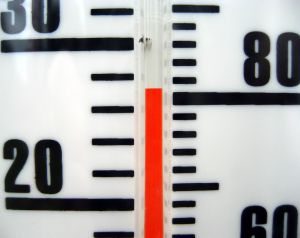Another day, another staid international organization reviews the latest climate science and rings the loudest possible alarm.
The World Bank’s sobering new report, “Turn Down the Heat: Why a 4°C Warmer World Must be Avoided,” warns that “we’re on track for a 4°C warmer world marked by extreme heat-waves, declining global food stocks, loss of ecosystems and biodiversity, and life-threatening sea level rise.”
Bank President Jim Yong Kim sums up the report with this blunt headline in the UK Guardian:
The latest predictions on climate change should shock us into action
A world four degrees warmer could be too hot to handle, but the exciting prospect of low-carbon living could stop it happening
This report should end the delusion that humanity can risk the preferred strategy of either the deniers (inaction) — or the hand-waving centrists (more research and development). The findings of this report match those of PricewaterhouseCoopers, which found that limiting warming to even 7°F requires “nearly quadrupling the current rate of decarbonisation.” That means the only rational clean-tech strategy for a non-suicidal species is “Deploy, Deploy, Deploy, R&D, Deploy, Deploy, Deploy“ [yes, not in that order].
The Bank report reviews the grim projections from dozens of the latest scientific studies (which I summarized here). It warns that “there is also no certainty that adaptation to a 4°C world is possible.” For instance, we face sea levels that could be rising an inch a year by century’s end! How do we adapt to that?
The impact on food security is particularly worrisome, with the latest science “much less optimistic” that the IPCC’s 2007 Fourth Assessment report:
These results suggest instead a rapidly rising risk of crop yield reductions as the world warms. Large negative effects have been observed at high and extreme temperatures in several regions including India, Africa, the United States, and Australia. For example, significant nonlinear effects have been observed in the United States for local daily temperatures increasing to 29°C for corn and 30°C for soybeans. These new results and observations indicate a significant risk of high-temperature thresholds being crossed that could substantially undermine food security globally in a 4°C world.
And that’s just temperature rise: “Compounding these risks is the adverse effect of projected sea-level rise on agriculture in important low-lying delta areas.” And then we have the threat to seafood of ocean acidification. Finally, we have Dust-Bowlification:
The report also says drought-affected areas would increase from 15.4% of global cropland today, to around 44% by 2100. The most severely affected regions in the next 30 to 90 years will likely be in southern Africa, the United States, southern Europe and Southeast Asia, says the report. In Africa, the report predicts 35% of cropland will become unsuitable for cultivation in a 5°C world.
That final point is worth underscoring: 4°C [7°F] is not even the high end of projected warming for 2100 if we stay near our current emissions path (see “The IEA And Others Warn Of Some 11°F Warming by 2100).”
The first and last line of President Kim’s Foreword are “It is my hope that this report shocks us into action…. The World Bank Group will step up to the challenge.”
Let’s hope he means it. The Bank’s inconsistency on climate has been widely noted — see “Why Does the World Bank Say it Cares About Climate Change, But Continue to Aggressively Push Coal?” The Bank has kept financing large coal plants — most infamously providing a $3.75 billion loan for one of the world’s largest coal plants, located in South Africa. The Bank also pushed a 600-MW coal plant in Kosovo.
On the basis of this report, the bank must stop funding all new fossil fuel plants. I use the word “must” because that is the word the report and President Kim repeatedly use.
And it must be “all new fossil fuel plants” because the International Energy Agency has made clear this year with detailed analysis that natural gas isn’t the solution if your goal is staying far from 7°F warming — see IEA’s “Golden Age of Gas Scenario” Leads to More Than 6°F Warming and Out-of-Control Climate Change. It must be noted that even that IEA gas scenario, which results in too much warning, assumes that not only does global oil consumption peak around 2020 — but so does coal! So if one or both of those peaks don’t happen — and they wouldn’t without a high price of carbon and aggressively clean energy deployment starting now — then the Golden Age of Gas is just Hell and High Water, the “devastating” scenario laid out in the World Bank report.
The time for action was a long time ago, but further delay means we are consciously abandoning our responsibility to our children and indeed all future generations.
This article was originally published on Climate Progress. Reproduced with permission.










